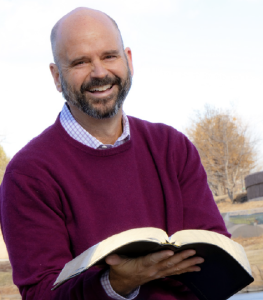God placed a burden on my heart some years ago while serving as a pastor that continues to gain momentum today. It’s an aspiration to heed the warning and accept the calling of Jesus, as stated in John 10:10: “The thief does not come except to steal, and to kill, and to destroy. I have come that they may have life, and that they may have it more abundantly” (John 10:10, NKJV). This statement is embedded in Christ’s revelation that He is the Good Shepherd, and His followers are His sheep. Abundant life is found in Jesus alone.
Perhaps you recall Sabbath school songs such as “I’ve got joy down in my heart, deep, deep, down in my heart.” And the fun of holding “air quote” fingers over your head as you sing “I just wanna be a sheep, baah, baah, ba, baah.” Yet somehow, life isn’t that simple.
While I could see myself as a lowly, not-so-smart sheep, God has placed immense value upon me as Jesus promised that He was willing to “lay down (His) life for the sheep” (John 10:15). Just as the psalmist wrote, “The Lord is my Shepherd” (Psalm 23:1) the value of my life is determined by God Himself. This establishes my truest identity—not my performance, popularity or the approval of others. However, the “thief” whom Christ refers to as the “father of lies” (John 8:44) is the devil himself, who seeks only to “steal, and to kill, and to destroy.” And we are no match for his methods.
One of the ways the thief destroys is through unnecessary anxiety and stress we often carry, which have devastating effects on how we view our identity and value. The life of
joy, fulfillment and blessing can easily become stolen and even killed by anxiety, stress, worry and the cares of this world. But of course the temptation is always present to convince everyone that we have it all together… while we are dying instead. Even if all the devil achieves is keeping us too busy and distracted, overwhelm and exhaustion so easily replace the joy of a fully engaged life that Jesus desires for us.
Identity and values
As part of my role as Mid-America Union ministerial director, I’m continuing to develop a ministry for pastors and local church leaders that I have named Restore the Joy of My Vocation. This is an invitation to get your life back by taking responsibility for your circumstances and allowing Jesus to restore in you the fullness of joy He intends.
The word “vocation” shares its origin with the term “calling,” typically associated with a deeper sense of purpose and significance. Your vocation is as unique as your fingerprint if you allow the Good Shepherd to shape you to be (identity) and do (purpose) His will in your life. After all, we are human beings, not human doings.
In addition, Restore the Joy is also about learning how to engage in a healthy manner with the troublesome world and anxious people with whom we interact every day, while maintaining healthy boundaries of our identity and values.
A scripture that has become increasingly meaningful to me is Gal. 6:4,5, and I love the way the Message Bible translates it: “Make a careful exploration of who you are and the work you have been given, and then sink yourself into that. Don’t be impressed with yourself. Don’t compare yourself with others. Each of you must take responsibility for doing the creative best you can with your own life.” Notice that “who you are” and “the work you have been given” are two separate things, and that God calls us to be good stewards and take responsibility to live our best life.
Consider these wonderful words about Jesus: “As a child, Jesus manifested a peculiar loveliness of disposition. His willing hands were ever ready to serve others. He manifested a patience that nothing could disturb, and a truthfulness that would never sacrifice integrity. In principle firm as a rock, His life revealed the grace of unselfish courtesy.” 1 The personality of Jesus was a wonderful blend of love, patience, truthfulness and integrity. His servant-heart and unselfishness were all implanted “firm as a rock” in the principles, or values, by which He lived.
This tells me several things about Jesus as a human. The first is that He had developed a set of principles by which he would live no matter how other people behaved. He also guarded these convictions and principles even when others mistreated, abused and even beat Him. Furthermore, Jesus was unthreatened by others because He knew He was God’s beloved Son, with Whom God was well pleased.
Your identity reflects your values; thus it’s important to pursue clarity of how God has uniquely wired each of us as His masterpiece (see Eph. 2:10), but also that you are His child, His beloved, that your greatest identity and value is found in Christ. These Spirit-led convictions serve as the lens through which you view the world around you. When confronted by anxiety or stress or criticism, it’s much easier to compare this information against the truth of who you are rather than thoughtlessly react in words and behavior. Hidden gems are found in the bumps and bruises of life, but when we are clear about who we are and what’s of utmost importance, it’s easier to let the exterior of things not trouble our souls as much.
It’s a beautiful thought to think that “Jesus possessed a dignity and individuality wholly distinct from earthly pride and assumption; He did not strive for worldly greatness, and in even the lowliest position He was content.”2 Oh, to have a character like Jesus—and that’s precisely what God has called each of us to be as His disciple. Only Jesus can offer us an individuality fully rooted in Him, in which He produces the fruits of His Spirit within us, no longer dependent on our own sense of pride or the approval of others. “Jesus was never elated with applause, or dejected by censure or disappointment. When he met with the greatest opposition and the most cruel treatment, he was of good courage.” 3
Jesus was motivated by His identity as God’s Son as well as His mission to save the world. His identity and purpose served as a guide in every circumstance He encountered. Jesus did not seek the approval of men, but “He is despised and rejected by men, A Man of sorrows and acquainted with grief” (Isaiah 53:3). We don’t see Jesus moping around or pleading with people to like Him, or responding harshly to criticism. We see Him fully engaged with people throughout the Gospels, yet unmarred and undeterred by ill treatment.
Life-giving boundaries
This healthy individuality requires boundaries that serve as sentinels to what is most important to you and God’s calling on your life. We call a boundary around your calendar a schedule, a boundary on your finances a budget, and a boundary around your work a rest. It’s often with the best of intentions that we establish boundaries only to find them come crashing down around us when the demands of our time, treasures and talents are tested to the max. This brings together the idea that our emotional and spiritual well being is a matter of good stewardship, which includes self-awareness and self-care.
calendar a schedule, a boundary on your finances a budget, and a boundary around your work a rest. It’s often with the best of intentions that we establish boundaries only to find them come crashing down around us when the demands of our time, treasures and talents are tested to the max. This brings together the idea that our emotional and spiritual well being is a matter of good stewardship, which includes self-awareness and self-care.
Now, going back to my heart’s desire to live in healthy balance in the physical, spiritual, emotional and relation areas of life: Achieving this blessed stability begins with being crystal clear on my values, protecting those values with life-giving boundaries, and continuing to grow in Jesus each day in my emotional and spiritual maturity. A life thus lived offers the ability to counter anxiety and stress that seeks to steal our joy with curiosity and not contempt, with compassion instead of blame, with tenderness instead of defensiveness.
Now doesn’t that sound a little bit like an abundant life in Jesus?
1 Desire of Ages, p. 68
2 Desire of Ages, p. 87
3 Gospel Workers, p. 92
Watch for Part 2 next month where we will explore how the Sabbath can serve as a restorative boundary to our emotional and spiritual well-being.
Craig Carr is ministerial director for the Mid-America Union Conference.










